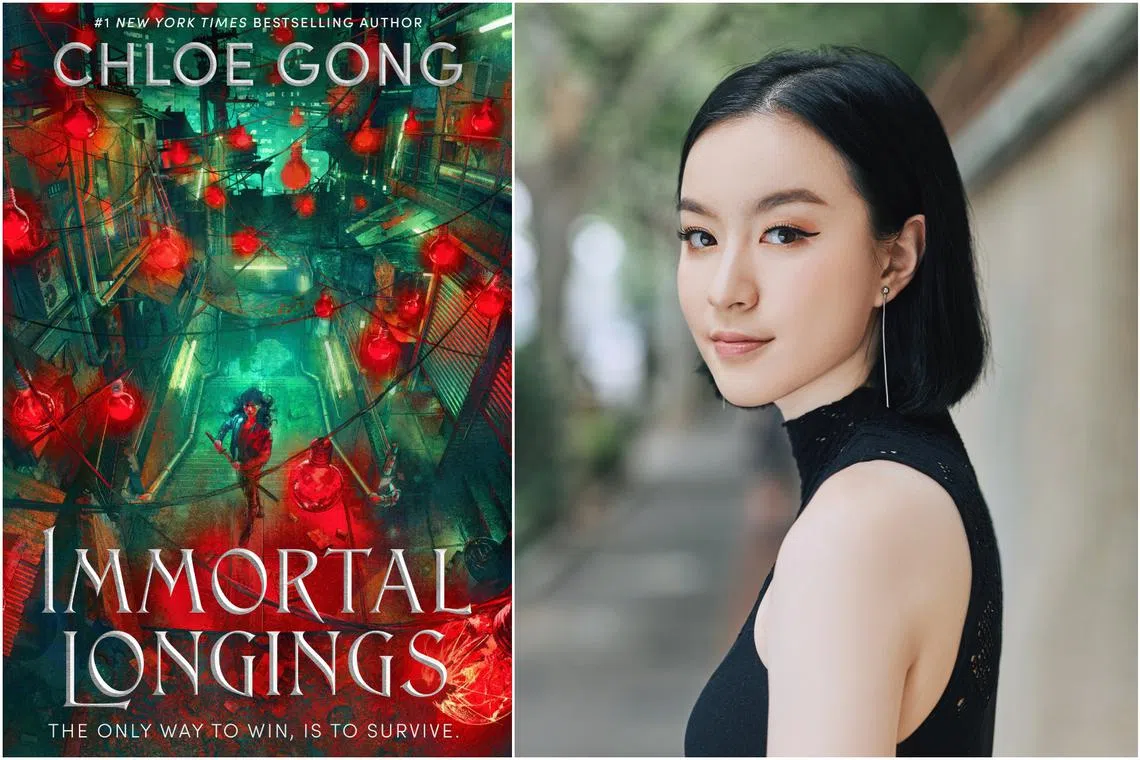Book review: Chloe Gong’s adult fantasy Immortal Longings does not live up to hype
Sign up now: Get ST's newsletters delivered to your inbox

Immortal Longings is the first adult fantasy novel from New York Times best-selling author Chloe Gong.
PHOTOS: COURTESY OF HODDERSCAPE, JON STUDIO
Follow topic:
Immortal Longings
By Chloe Gong
Fantasy/Gallery Press/Hardcover/384 pages/$45.39/Amazon SG (amzn.to/3Yv2o4B)
3 stars
Immortal Longings, the first book in the Flesh & False Gods fantasy trilogy by Chloe Gong, is something of a letdown. Described as Gong’s “adult epic fantasy debut” and “inspired by Shakespeare’s Antony And Cleopatra” by the publisher, it sadly falls short of the grand scope of epic fantasy.
The New Zealand author became popular with her young adult novels, These Violent Delights (2020) and Our Violent Ends (2021) – a retelling of Romeo And Juliet, set in 1920s Shanghai.
In this new work, the palace in the poverty-stricken kingdom of Talin hosts a deadly annual game in the twin capital cities of San-Er, where competitors with the ability to jump between bodies fight to the death for a chance at wealth.
Princess Calla Tuoleimi and the exiled Anton Makusa enter for different reasons. Calla wants to kill the king for his selfish reign while Anton seeks to pay off medical debts accrued by a childhood love.
Neither can lose, but an alliance might be their best chance at getting what they want, even if only one of them comes out alive.
Calla says of the injustices in San-Er: “Those inside the city walls are cockroaches, but those outside the city walls aren’t even living creatures, merely parts of the landscape that the palace can mow over and reshape as it wishes.”
The narrative is certainly exciting, filled with well-choreographed fight scenes that get the blood pumping.
Knowing what is at stake also makes for a tense plot, particularly as Calla and Anton are hiding their identities. Their alliance offers opportunities for amusing and quippy banter, a signature of Gong’s earlier novels.
Calla is callous in her killings of competitors, saying: “Each time she swings her sword, the feeling that sits heavy in her rib cage is not guilt. It is a jarring sensation that tells her this is wicked, but wickedness is tolerable.”
Anton, who kills with similar ease, still manages to maintain his humanity, urging younger characters to make something of themselves rather than running in the streets or competing in the deadly competiton.
However, the novel falters in its world building, lacking clear explanations in the beginning of how kingdom politics work.
Gong drops readers into this world, expecting them to understand the choppily written backstory. There are conversations about fixing the poverty and injustices San-Er has long faced, with minor mentions of the kingdom’s history. But these do not add up to a convincingly coherent world.
Despite being an adult fantasy, the characters feel nearly indistinguishable from Gong’s young adult protagonists. It is easy to forget that Anton is 25 and Calla is 23 as their behaviour and outlook could easily be those of teens who lived difficult lives.
The romance is awkwardly paced and developed. The alliance born out of their combat skills and recognition of each other’s true identities turns into “I love yous” in the span of a few weeks.
Were the novel to expand its backstory and establish stronger foundations for its central relationship, the novel could be more captivating than a series of exciting fight scenes.
What lingers is a sense that Gong did not live up to the bar she set in her own young adult novels.
If you like this, read: The Hunger Games by Suzanne Collins (Scholastic, 2008, $26.89, Amazon SG, go to amzn.to/3OsPVtL
This article contains affiliate links. If you buy through these links, we may earn a small commission.


